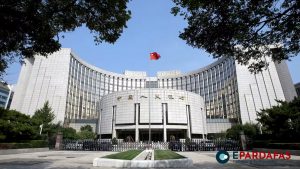
China’s Real Estate Slump Shatters Myth of Ever-Rising Prices: A Critical Turning Point for the Nation’s Economic Landscape
In a pivotal moment for China’s real estate market, a Hong Kong court is set to decide the fate of China Evergrande Group, formerly the nation’s largest property developer, on Monday. The anticipated decision comes amid a protracted slump in the real estate sector, which constitutes approximately 30% of China’s gross domestic product, sending shockwaves throughout the economy.
“The myth of rising prices has been completely destroyed,” remarked Huang Li, a real estate consultant in Guangzhou, underscoring the prevailing sentiment that current property prices are untenable.
In Huizhou, a city neighboring Shenzhen, a salesperson divulged a 25% discount on a new condominium, which was later discreetly dropped by an additional 14%. Despite these drastic price cuts, the ability of real estate agents to alleviate immediate cash flow issues is hampered by government restrictions responding to protests from buyers who signed contracts before the reductions.
Local governments, reliant on revenue from land-use rights sold to real estate companies, are hesitant to allow further price drops. This reluctance stems from concerns that such reductions could undermine fiscal stability, creating a precarious situation for both developers and local authorities.
The Chinese Communist Party recognizes the shifting dynamics, acknowledging a substantial change in the supply-demand relationship. However, effective solutions to rectify distortions in the real estate market and avert a bursting bubble remain elusive, Nikkei Asia Reported.
Since 2020, President Xi Jinping’s administration has implemented measures to prevent market overheating, tightening financing for developers and reducing mortgage availability. This has led to a rapid deterioration in cash flow for real estate companies, causing construction delays and leaving numerous projects unfinished.
China’s zero-COVID policy and heightened household anxiety about the future have further dampened the housing market. The average price for newly built condominium units in major cities has seen a record 19 consecutive months of decline, exacerbating the prolonged stress in the real estate sector.
Notably, incomplete skyscrapers, once symbols of prosperity, now stand unlit and deserted in cities like Dalian, reflecting the industry’s challenges. In Hegang, a city in Heilongjiang province, a novel approach is underway to attract residents and revive the housing market. The city government offers tax exemptions and free office space to individuals relocating, resulting in nearly 1,000 new family registers within six months.
Despite isolated success stories like Hegang, many cities face economic decline, impacting businesses that rely on the real estate sector. Specialty stores in building material markets report dwindling foot traffic, with long-established businesses struggling to stay afloat.
The ripple effects of the real estate crisis extend beyond domestic borders. Major developers like China Evergrande Group, facing financial distress, are prompting companies to explore overseas markets for salvation. At the China Import and Export Fair in Guangzhou, a stone company expressed eagerness to expand its business to the Middle East and other regions.
With the industry’s share of Chinese GDP skyrocketing from less than 10% in the 1990s to 30% today, the repercussions of the real estate downturn are felt far and wide. As China grapples with finding a way forward, the metaphorical “whale” of the real estate industry may well be sinking, pulling smaller players down with it. The road to recovery for those accustomed to robust domestic demand appears arduous, highlighting the challenges ahead for the once-thriving sector.













Comments